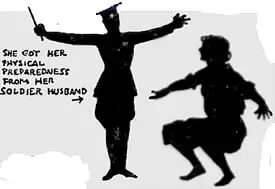Life begins to be better in one’s middle age.
Life begins at forty
What's the meaning of the phrase 'Life begins at forty'?
What's the origin of the phrase 'Life begins at forty'?
The notion that ‘life begins at forty’ is a 20th century one; prior to that it was more accurate to say ‘death begins at forty’ as most people didn’t live much beyond that age. Life expectancy in medieval England was around 25 years and only reached forty sometime around the turn of the 20th century. By the 1930s many, in western societies at least, could expect a decent spell of reasonably affluent retirement, free from work and the responsibilities of childcare. Household gadgets like washing machines and vacuum cleaners were becoming more widely used and had begun to relieve women’s drudgery and offer them increasing amounts of leisure time as compared to their Victorian mothers.
In 1932, the American psychologist Walter Pitkin published the self-help book Life Begins at Forty. Pitkin stated confidently:
Life begins at forty. This is the revolutionary outcome of our New Era. Today it is half a truth. Tomorrow it will be an axiom.
Pitkin is often credited with coining the phrase and, while it is true that his popular book was the cause of it becoming part of the language, he wasn’t the first to express the idea, or even the phrase itself. The take-up of the idea was rapid and ‘life begins at forty’ appears many times in newspapers and other printed records from 1932 onwards. This was propelled further into the American consciousness in 1937 via a recording of the song ‘Life begins at Forty’, written by Yellen and Shapiro and sung by Sophie Tucker.
However, we need to go back a way to find the origin of the phrase. The great 19th century German philosopher Arthur Schopenhauer came close to it with his view:
“The first forty years of life give us the text: the next thirty supply the commentary.”
In keeping with the reduction of the toil of domestic work and child rearing that began freeing up women’s free time to some extent at the start of the 20th century, the first reference to life beginning at forty refers specifically to women.
Mrs. Theodore Parsons was Physical Director of Schools in Chicago and, in 1912, wrote Brain Culture Through Scientific Body Building. It wasn’t a runaway best-seller, but the arrival of the USA in the First World War in 1917 gave her views a new lease of life. In April of that year The Pittsburgh Press printed a feature on Mrs. Parsons and her no-nonsense opinions about the benefits of a brisk exercise programme that she acquired from her soldier husband (Mr. Theodore Parsons was, sadly, recently deceased – presumably from exhaustion):
“The average woman does not know how to breathe, sit, stand or walk. Now I want women to train for the special duties which may devolve upon them in war time. Death begins at thirty, that is, deterioration of the muscle cells sets in. Attention to diet and exercise would enable men and women to live a great deal longer than they do today. The best part of a woman’s life begins at forty.”
What special duties Mrs. Parsons had in mind, stationed as she was in Chicago, isn’t clear. The paper was good enough to include a graphic of the dynamic couple, demonstrating their method in action, so you can give it a try and see if it works.
Life expectancy has continued to move on and forty now seems no age at all. In 1991, the New York Times printed this opinion:
All our age benchmarks, which used to seem solid as rocks, have turned into shifting sands. ‘Life begins at 40? More like 60’.
See also: the List of Proverbs.
The history of “Life begins at forty” in printed materials
Trend of life begins at forty in printed material over time
Related phrases and meanings
Browse more Phrases
About the Author

Phrases & Meanings
A-Z
A B C D E F G H I J K L M N O P Q R S T UV W XYZ
Categories
American Animals Australian Bible Body Colour Conflict Death Devil Dogs Emotions Euphemism Family Fashion Food French Horses ‘Jack’ Luck Money Military Music Names Nature Nautical Numbers Politics Religion Shakespeare Stupidity Entertainment Weather Women Work
How did we do?
Have you spotted something that needs updated on this page? We review all feedback we receive to ensure that we provide the most accurate and up to date information on phrases.
